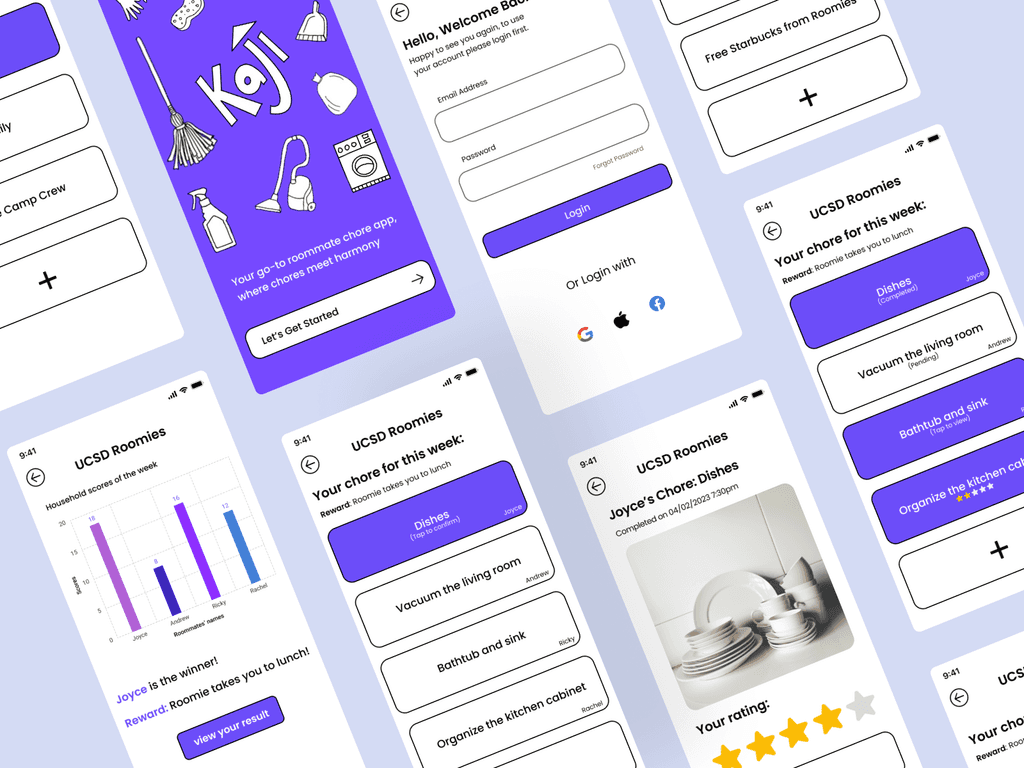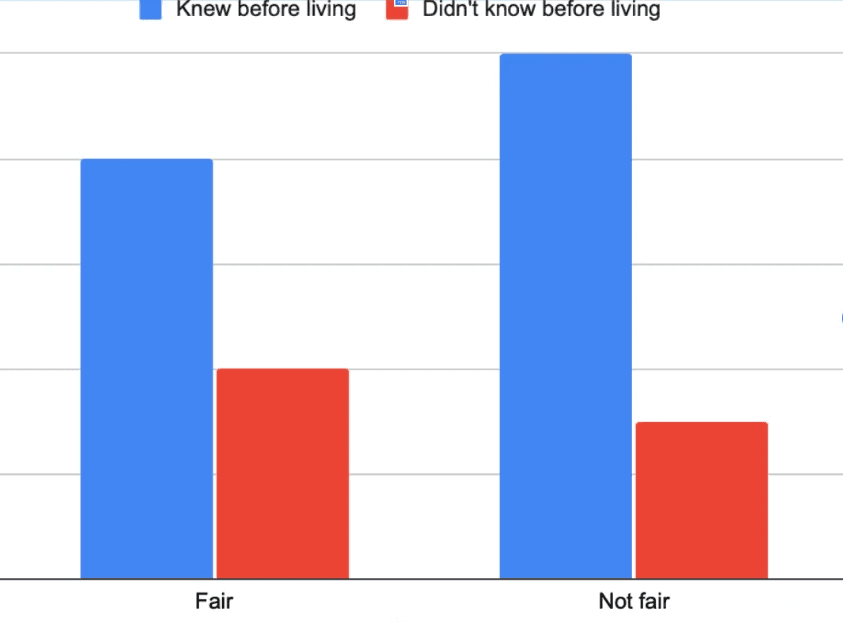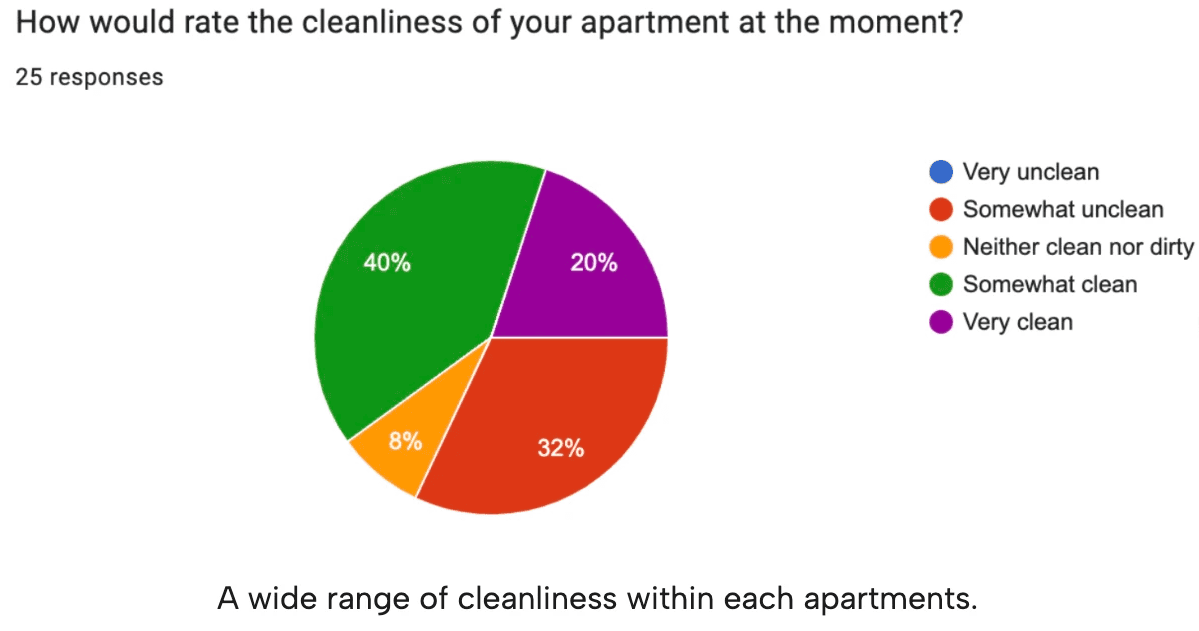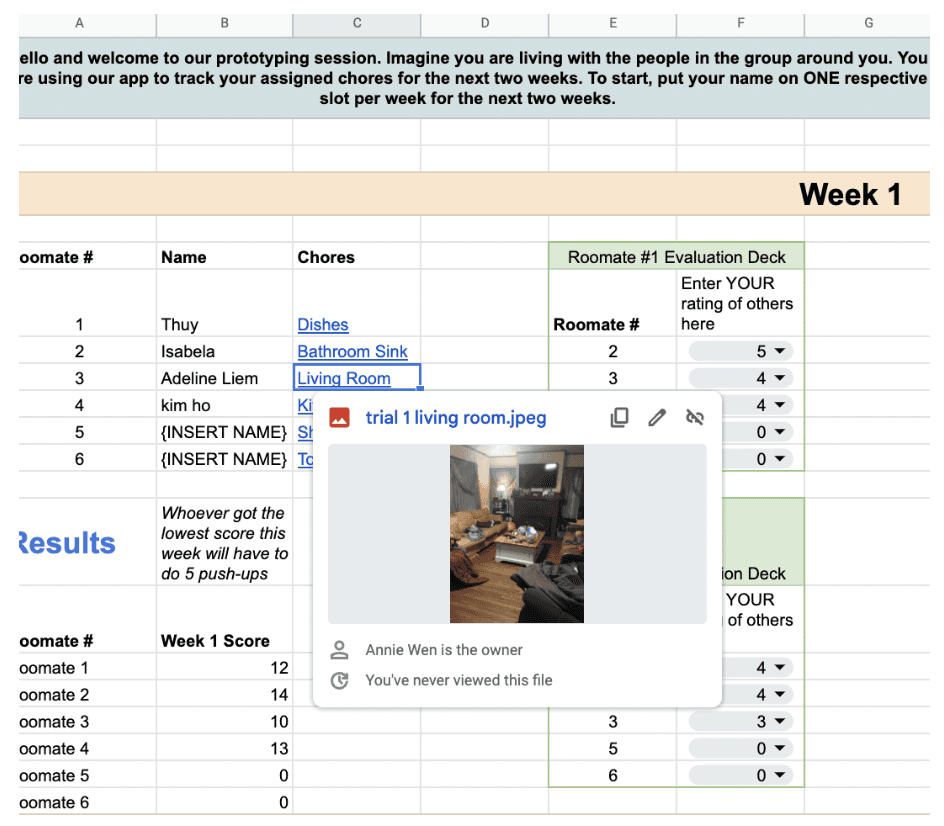Kaji
Where Chores Meet Harmony
A chore app designed for roommates, fostering harmony in shared living spaces.

My role
UX Researcher
UX Designer
Timeline
March-June
2023
Teammates
5
Tool
Figma
Google Sheets
Motivation: Why it Matters?
Splitting chores with roommates can be a tedious and daunting task, and a chore app can simplify the process by promoting fairness and holding everyone accountable for their share of the work. The motivation behind building a roommate chore app is to make sharing a living space with roommates a more harmonious experience. By using a chore app, roommates can communicate more effectively, reduce stress, and improve the overall living environment. Ultimately, a chore app can make living with roommates a more enjoyable and fulfilling experience.
What is Kaji?
Meaning “chores” in Japanese, we aim to help shared households function more efficiently and effectively within the context of shared household chores while alleviating stress and or any negative experiences between housemates.

Our Approach
Our approach for designing Kaji starts with an online survey, user interviews and competitive analysis of other chore apps.
Online Survey
An online survey was sent to random UC San Diego students to collect quantitative data. The survey received 25 responses. It included 2 demographic and 11 non leading insight questions. the questions are mostly quantitative on the likert scale and multiple choice, with a few short responses. The list of questions include
Do you have roommates?
Do you know your roommates before living together?
How would you rate the cleanliness of your household at the moment?
Number of people in the household including yourself?
Size of your apartment?
How do you currently split chores?
Do you feel that chores are fairly split? If yes, what is the system you do that works? If no, why is it not working?
How do you feel about your level of contribution?
Do you live on campus or off campus?
Do you have a cleaner?
Gender, age?
From this survey we realized that over half of the respondents, 13 out of 25 people believe that their chores are not split evenly. 56% (4 out of 7) of random roommates felt chores were split fairly and 44% (8 out of 18) of pre-chosen roommates felt chores were split fairly. 40% (10 out of 25) of the respondents express their apartments are not as clean to their liking.

User Interviews
We conducted user interviews with 5 UC San Diego students. 4 of them live off campus and 1 of them live on campus. The user interviews were conducted in person or on a call, giving us valuable qualitative data. When conducting the interviews, we followed an interview protocol as follows:
start by introducing ourselves and providing a brief description of the aim of the project, ask for consent to be recorded, if not then just take notes
ask questions regarding demographic, their current chore system, and how they solve conflicts
ask follow up questions along the way
end by thanking them for their participation
From the user interviews, we found out that 4 our of 5 participants don't have a chore system. Out of the 4 participants, 2 once had a chore system but failed. No participants had a system for accountability. The one participant that has a chore system lives on campus, where cleaning ladies come once a week, so students only need to take out trash.
User Research Insights
Looking at our survey and interview, we gathered some important research insights.
chore systems are very easy to fail
people expect their roommates to clean up after themselves
"clean as u see fit" - User Survey
"Everyone just takes out the trash whenever they see it’s full." - User Survey
sometimes people are afraid of confrontations so would be great to have a system to avoid conflict
on campus and off campus housing has very different living situations
on campus housing have cleaning lady every week, students only need to take out trash
therefore we need to decide on demographic of our app
when only having one chore, people can keep track of more easily
adds on motivation for this app
Miscommunication is one of the main factors as to why chores don’t get split evenly
People tend to set vague expectations
"Whenever we feel like it, we’re not that strict about it if we get too busy/stressed to do chores." - User Survey
“ We don’t assign chores, we just do it whenever we see it” - Krystal, user interviewee
Too many people in a household makes in difficult for division of labor
From these insights, we conclude that a system that works include a proper documentation cycle and an even distribution of labor.
Primary Users
Our core users are students or young adults living in shared housing such as college dorms, off-campus housing, or young professionals living together early in their careers.
Social Setting
For the purposes of testing our prototype throughout the quarter, the social context of our project is a house of undergraduate students who are living off campus together. However, they struggle with having disagreements when assigning chores equally and often feel frustrated when trying to confront each other.
What is the Impact?
It promotes fairness:
A chore app can help ensure that each roommate is responsible for an equal share of the household tasks. This can prevent one roommate from feeling like they are doing more than their fair share of the work.
It improves communication:
By using a chore app, roommates can communicate more effectively about who is responsible for which tasks and when they need to be done. This can prevent misunderstandings and help avoid conflicts.
It reduces stress:
When household tasks are divided up fairly and completed on schedule, it can reduce the stress and tension that can arise when one person feels like they are carrying the burden of the household chores.
It improves the living environment:
When household tasks are completed on schedule, it can lead to a cleaner, more organized living environment. This can promote a sense of well-being and make the living space more pleasant to be in.
It improves accountability:
A chore app can help ensure that all roommates are contributing equally to the maintenance of the living space. By assigning tasks and tracking completion, it can be easier to hold each roommate accountable for their share of the workload.
It reduces conflicts:
Chore-related conflicts are a common source of tension among roommates. By using an app to assign tasks and keep track of completion, it can help prevent misunderstandings and disagreements that might otherwise arise.

Do you feel that chore are fairly split?
Almost half of our 25 participants indicated that they felt like their chores weren't fairly split.

Did you know your house mates before?
Roommates who knew each before indicated that their chores were being unfairly split, more so than strangers.

How would your rate the cleanliness of your apartment?
A wide range of cleanliness within each apartments.
Prototype Session I
We conducted our first prototype session in week 8 and mainly through the google spread sheets. Below is a screenshot of the google spread sheet prototype and how users can view their tasks' photos by click on the chores list.
Instructions of our prototype session I :
Break into 4 groups - these will be your housemates
Open the Kaji prototype and input your names to assign chores for week 1
Week 1 is over, click on each of the assigned chores to see how each of your roommates did.
Now each housemate will give a score 1-5 for every other housemate in 5 minutes
The roommate with the lowest score will get a punishment and roommate with the highest score will get an incentive.

How do we conduct our evaluation session?
i. Two of our group members will give a demo of the prototype to the audiences
ii. Reorganize audiences into a group of 4-5 people
iii. Each group will then test our prototype via google sheets
iv. Collect data and feedback from audiences through our evaluation survey
Key insights from our evaluation sessions
We did our first prototype session in week 8 and we altered our prototype according to the feedback survey of week 8. We then did another prototype session in week 10 and here are some of the key comments from both sessions:
Week 8 Comments:
“Its fairly straightforward to use, but lacks the ability to be dynamic to what the users put in, ie: using the roommate number as identification can be kind of clunky.”
“Kaji was easy and fun to use. A weak area would be that sometimes people can tie in scores so how would you deal with that, do both people get a reward/punishment.”
“Maybe having more specific chore lists to assign to people? For example instead of "cleaning the living room" could be "vacuuming the living room" or "wiping the dining table" etc.”
Week 10 Comments:
“I think the added feedback comment section was a really cool feature!”
“i thought the functionality was good! google sheets was used well for this, especially with the formulas. i was only confused about the “sorted data” table and “week 1 score table” bc i feel like these could be combined?”
“I like the usability. The sheet functions make things much easier. I am excited to see if ya’ll have screens in the final project.”
What changes have we made from our prototype session I?
Confusing inputs
Made more dynamic with custom formulas
Individual preferences between reward/punishment, but no statistical difference in effort
We allow users to decide the incentive or punishment for each week household chores
Difficult to visualize scores
We input data visualizations (score graph) for the results
People want to justify scores they give
We added a feedback section for users to give additional comments or suggestions for their roommates
Social Complexities and Challenges
This social setting for this prototype is a household with roommates. Through our research, we realized that different living situations can have a big impact on how people assign chores and resolve conflicts. For students living on campus, they have a cleaning lady every week to clean their dorms, and they would only need to take out trash. When roommates only need to coordinate one task, it is very easy and there are usually no conflicts. For a family household, chores are usually done for the entire household instead of each person only being responsible for themselves. Often, roommates are randomly assigned or found randomly online, this means that people are not close to each other and communication barriers can occur. It was a challenge to take all possible household dynamics into consideration. Our prototype had two main components, one is to assign chores, and the other is to evaluate chores. We tried to overcome this challenge by giving the user the flexibility to determine the type of chores, and the type of incentive. This allows the app to accommodate as many households as possible. However, at the same time, chores are rotates every week between roommates to ensure fairness. It would be beneficial to explore how we can design for all households.
In our prototype, there’s a feedback section for roommates to explain their ratings and give feedback. This is a space meant for constructive feedback, however the people can write anything they’d like. This includes malicious comments. Mean comments can be a source of more drama. Looking at other platforms such as YouTube and Instagram, comment sections can be viewed poorly regulated, especially when people are anonymous. To prevent people from leaving malicious comments, Kaji requires all roommates to use their name. If we had more time, we'd also like to also consider other ways to curate a safe space for everyone.



